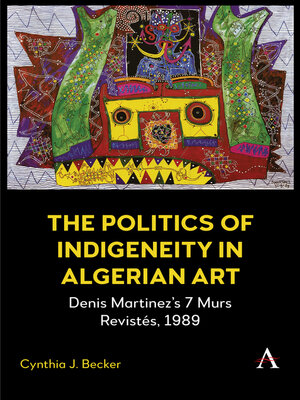The Politics of Indigeneity in Algerian Art
ebook ∣ Denis Martinez's 7 Murs Revistés, 1989
By Cynthia J. Becker

Sign up to save your library
With an OverDrive account, you can save your favorite libraries for at-a-glance information about availability. Find out more about OverDrive accounts.
Find this title in Libby, the library reading app by OverDrive.



Search for a digital library with this title
Title found at these libraries:
| Library Name | Distance |
|---|---|
| Loading... |
This book project explores the history of modern Algerian art through the work of artist Denis Martinez, focusing on his 1990 exhibition 7 murs revisités ["Seven Walls Revisited"]. Held in a rural Amazigh cultural center on the eve of the Algerian Civil War (1992–2002), Martinez developed close ties with Amazigh (Berber) communities, who had long protested for cultural recognition within a post-colonial state that privileged an Arab-Islamic identity. The book argues that in decolonizing nations, modern art often exposed internal cultural and political tensions. Algeria, after 132 years of French colonization, struggled to define a cohesive national identity that did not exclude many of its own people. As an Algerian of Spanish descent, Martinez embraced Algeria's pluralism and turned to Amazigh art not just for aesthetic inspiration but also to advance a broader vision of inclusive citizenship. His collaboration with Indigenous communities fostered a form of subversive localism that challenged dominant nationalist narratives. Martinez's work serves as a powerful lens into the complexities of post-colonial identity. He imagined that Indigenous visual representation could confront systematic marginalization, transform power structures, and construct a more equitable future.







